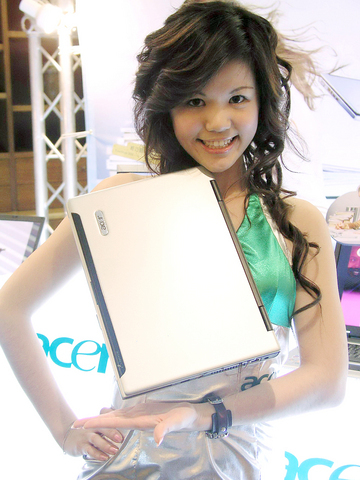Acer Inc, the world's fourth-largest computer maker, will continue promoting its desktop-computer business next year in a bid to become the No. 3 player in the market by 2007, company executives said yesterday.
The company aims to ship around 7 million desktop computers next year, around 4 million units more than this year, and hit the 10-million mark in 2007, Scott Lin (林顯郎), president for Taiwan and Hong Kong operations, told reporters at a product launch yesterday.
"We have been dedicating more resources to notebook products in the past three years and have now established a name in markets worldwide. Therefore, we want to put a greater emphasis on our desktop lineup next year," he said.

PHOTO: CHOU YI-CHUN, TAIPEI TIMES
While most brandname vendors are gearing up for a slice of the highly competitive notebook market, it will be a good chance for Acer to keep a balance between the desktop and laptop segments, with both offering similar margins, Lin said.
Citing local surveys, he added that 84 percent of desktop users who assemble their own computers do so to save money, while the rest are enthusiasts. Therefore, Acer will introduce branded desktops based on the do-it-yourself principle to capture a bigger market share, he added.
Statistics from market researcher International Data Corp released last month indicated that worldwide computer shipments jumped 17 percent in the third quarter on better-than-expected sales of notebooks and low-cost PCs.
The top three vendors were Dell Inc, Hewlett-Packard Co and Lenovo Group Ltd (聯想), with market shares of 18 percent, 16 percent and 7.7 percent respectively.
Acer, ranked fourth with 4.7 percent, has set a target to outpace China-based Lenovo to become the No. 3 player within the next two years.
Eyeing the growing computer demand, the company launched a slew of desktops and portable computers yesterday.
With prices starting as low as NT$20,000 (US$594), its Veriton 2800 series is a range of customized desktop computers geared toward business users. The Aspire L300 series, priced below NT$45,000, will target the digital home segment.
The new TravelMate 3300 and 3230 are 14.1-inch notebooks weighing 2kg or less that offer business users functionality such as Bluetooth capability and a DVD burner.
Acer reported local sales amounting to NT$6.3 billion in the third quarter, representing 78 percent growth over a year ago. Its shares were up NT$0.30, or 0.4 percent, to close at NT$72.80 on the Taiwan Stock Exchange yesterday.

JITTERS: Nexperia has a 20 percent market share for chips powering simpler features such as window controls, and changing supply chains could take years European carmakers are looking into ways to scratch components made with parts from China, spooked by deepening geopolitical spats playing out through chipmaker Nexperia BV and Beijing’s export controls on rare earths. To protect operations from trade ructions, several automakers are pushing major suppliers to find permanent alternatives to Chinese semiconductors, people familiar with the matter said. The industry is considering broader changes to its supply chain to adapt to shifting geopolitics, Europe’s main suppliers lobby CLEPA head Matthias Zink said. “We had some indications already — questions like: ‘How can you supply me without this dependency on China?’” Zink, who also

The number of Taiwanese working in the US rose to a record high of 137,000 last year, driven largely by Taiwan Semiconductor Manufacturing Co’s (TSMC, 台積電) rapid overseas expansion, according to government data released yesterday. A total of 666,000 Taiwanese nationals were employed abroad last year, an increase of 45,000 from 2023 and the highest level since the COVID-19 pandemic, data from the Directorate-General of Budget, Accounting and Statistics (DGBAS) showed. Overseas employment had steadily increased between 2009 and 2019, peaking at 739,000, before plunging to 319,000 in 2021 amid US-China trade tensions, global supply chain shifts, reshoring by Taiwanese companies and

Taiwan Semiconductor Manufacturing Co (TSMC, 台積電) received about NT$147 billion (US$4.71 billion) in subsidies from the US, Japanese, German and Chinese governments over the past two years for its global expansion. Financial data compiled by the world’s largest contract chipmaker showed the company secured NT$4.77 billion in subsidies from the governments in the third quarter, bringing the total for the first three quarters of the year to about NT$71.9 billion. Along with the NT$75.16 billion in financial aid TSMC received last year, the chipmaker obtained NT$147 billion in subsidies in almost two years, the data showed. The subsidies received by its subsidiaries —

At least US$50 million for the freedom of an Emirati sheikh: That is the king’s ransom paid two weeks ago to militants linked to al-Qaeda who are pushing to topple the Malian government and impose Islamic law. Alongside a crippling fuel blockade, the Group for the Support of Islam and Muslims (JNIM) has made kidnapping wealthy foreigners for a ransom a pillar of its strategy of “economic jihad.” Its goal: Oust the junta, which has struggled to contain Mali’s decade-long insurgency since taking power following back-to-back coups in 2020 and 2021, by scaring away investors and paralyzing the west African country’s economy.